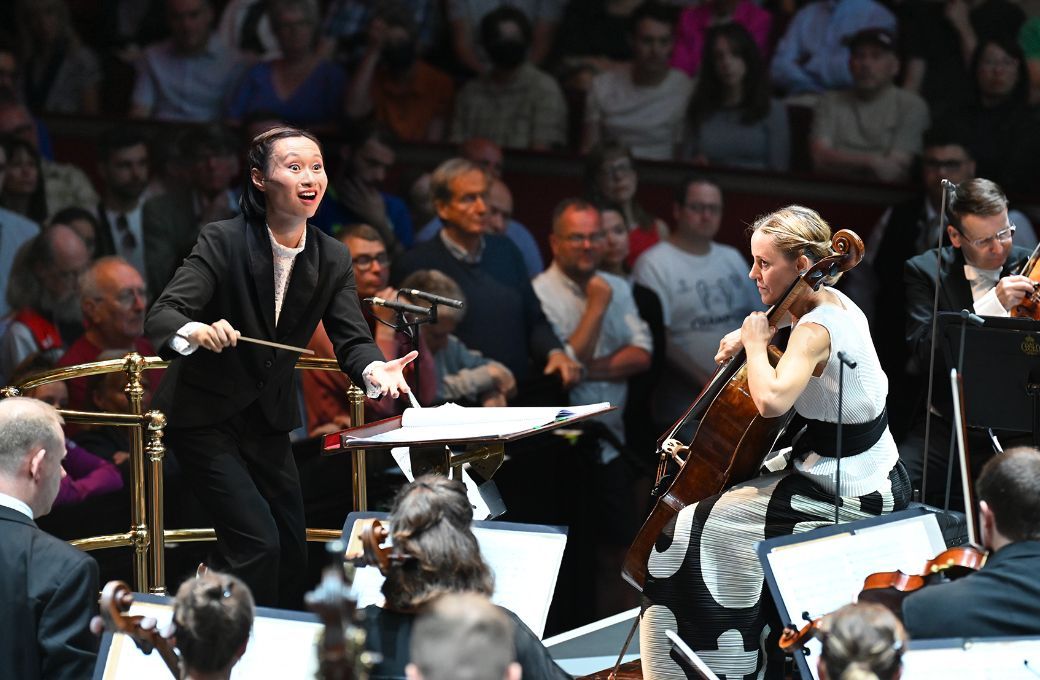Musically speaking, what would you like to wake up to in the morning? Something shrill that shakes you out of your last moments of slumber? Not exactly everybody’s cup of tea. But what could be better than to start a proper matinée concert – kicking off at eleven o’clock on a Sunday – with Dukas’ The Sorcerer's Apprentice? That dreamy opening (Assez lent) pushing you gently towards complete consciousness with nudges and tweaks before the dynamic takes off (Vif). Just right, surely.
Tianyi Lu, making her BBC Proms debut with the BBC Symphony Orchestra, delivered all the cauldrons of energy and precise detail contained in this symphonic Scherzo from 1897. What she didn’t quite manage to convey, however, was the chaos for which the apprentice alone is responsible. It was all rather spick-and-span, with little of the slithering over the sodden floor before order is restored. Comical bassoons remained po-faced.
Francisco Coll’s Cello Concerto was receiving its UK premiere in the presence of the composer and played by its dedicatee, Sol Gabetta. Within its span of 22 minutes and four linked movements, it travels through contrasting emotional territory as well as stretching the cello as far as it can go in both directions. From a sense of opening anxiety, given underlying force in the spiccato and staccato effects from both soloist and orchestra, the concerto soon relaxed into long, lyrical lines in the highest cello register, set against softly chirring accompaniment from woodwind and strings. All of this was quite magical. As were the waltz elements where at the opposite end of the cello’s range Gabetta conjured up playing of soulful intensity with burnished, saturated tone. She rose to all the technical challenges in the cadenza, too, with its requirement for furious double-stopping and sul ponticello.
Despite a battery of percussion and splashes of vibrant colour from the brass, there was much chamber-like delicacy in the piece, the astute balances between cello and orchestra maintained throughout, ensuring that the solo voice was never covered. The material Coll uses in the concluding Festoso is less tightly controlled than the preceding movements, yet in its nervous twitchiness this provides an effective link with the start, the hoochie coochie qualities emphasising the dance-like character. This extended to Gabetta’s encore, a piece composed specially for her by Coll, with the title The Secret Life of Tango.

Pigeon-holing Puccini, whose anniversary year this is, as the composer of verismo opera, leaves out of account some of his earlier work, such as the 1880 Messa di Gloria and the work he wrote two years later, the Preludio sinfonico. Dispensing with a baton, Lu revelled in its sensuous beauty and dramatic surges, aided by warm and generous playing by the BBCSO. It was fascinating to hear pre-echoes of Puccini’s celebrated operas, notably La bohème.
The last of the suites which Stravinsky made in 1945 from his Firebird ballet requires a smaller orchestra but incorporates additional sections to the 1919 iteration. Housekeeping would have been very happy with Lu’s reading: neat and tidy, all the hospital corners expertly turned down, delicacy and filigree instrumental detail much in evidence, pointillistic colour judiciously applied. But this was like listening to a fairy-tale in which all the terrifying elements had been redacted. The brass at the very start were just about in the picture but far from being ominous. Far more serious was the absence of a real snarl from this section in the Infernal Dance. To his dying day Stravinsky never lost his Russianness. Even with supreme polish, a pearl still needs to remind us of its origin in grit.


